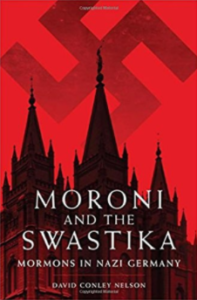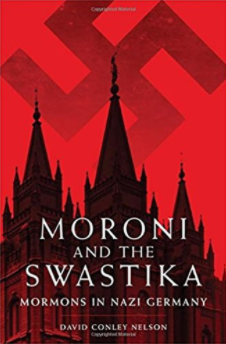
David Conley Nelson has written an extensive account of the Church of Jesus Christ of Latter-day Saints in Nazi Germany in his book “Moroni and the Swastika’. Desperate to keep the church alive during World War II the Mormons exploited congruences between the faith and the Nazi Party with shocking results.
Link to ‘Moroni and the Swastika’


Dear Steven,
Thank you for listening to my podcast. I hope that left you with the desire to read my book. To answer some of your concerns:
1. The reference to Mormons being “as likely to be the guards as prisoners” under the Third Reich was really a way of saying that Mormons were not persecuted as a religious group in Nazi Germany, and that those who did run afoul of the authorities got in trouble not because of their religious beliefs–but instead because of individual acts that would have caused difficulty for any citizen or resident of the Third Reich. My book gives a few examples of Mormons who did get into trouble for criticizing the government, such as Heinrich Worbs of Hamburg, who went to a concentration camp for making an intemperate remark about the Nazis while riding the streetcar.
It also tells about a Mormon, who joined the LDS Church in 1923 and then joined the SA in 1928. He ran a “wild” concentration camp in Berlin in 1933-34, where he tortured and murdered political prisoners (mostly Social Democrats and Communist Party members). Later, as a military policeman in occupied Poland, he sent post cards home stamped with the notorious locations of ghetto liquidations, urging his children to study their Sunday school lessons. In his case, at least, his devotion to the LDS Church did not mitigate his behavior.
No, I did not see much evidence that being the recipient of LDS teachings necessarily ameliorated the conduct of German Mormons, at least in relation to other Christians. Alan Keele did write a BYU Studies article about one SS trooper who deserted his unit and credited his church upbringing with his decision. On the other hand, my research found other active Mormons who enrolled in brown-shirted SA units, and another active member who became a member of the Totenkopfverbände, the Death’s Head SS brigades that ran the extermination camps.
2. Your question is a good one, but one that calls on me to generalize about religious teachings in an area where I am not an expert. I’m not terribly comfortable with that, so I’ll pass.
3. Probably not. As I understand it, the greatest degree of concern was motivated by a basic misunderstanding of Helmuth’s role as an anti-fascist revolutionary in Nazi Germany. As I say in the book and the podcast, nobody in German Democratic Republic would have confused an anti-fascist with an anti-communist. One of the best things the church could have done for itself in East Germany, according to conversations with other scholars, would have been to get permission to stage the play behind the Iron Curtain. But the church hierarchy, probably reacting to the shock of 1960s student activism, misunderstood this basic tenet.
I did attempt to interview both Monson and Wirthlin, before Monson became church president and before Wirthlin passed away. I couldn’t get any closer than a phone conversation with the church public affairs office, which dismissed my request.
Are you aware of any incipient youth activism among Mormons in Chile and Argentina?
4. I’m very uncomfortable, as a student of Nazi Germany and the Holocaust, with crediting Hitler with doing any “good” that distinguishable from what other governments were attempting. Hitler’s government did very little that was unique when it engaged in basic Keynesian economic pump priming of the Depression-era economy. Yes, the Nazis had the Reichsarbeitsdienst (labor corps) and highway building, but Franklin Roosevelt’s New Deal had the CCC, the WPA, and agricultural subsidies. France also attempted to spend its way out of the Depression through the left-wing Popular Front.
Youth groups that stressed physical fitness in Germany predated Hitler’s regime by decades. Read in my book about the mission president’s wife in Berlin, who became very concerned with the lack of moral standards in the Hitler Youth and the League of German Girls, especially when 900 German teenage girls came home pregnant from the 1936 Nuremberg rally.
5. Mormons in Nazi Germany had very few outlets for “getting involved in politics.” The church over there (during the prewar era) was run by American mission presidents, who wisely did not become entangled with the politics of their host country, except to support the regime. Once the Americas went home, the Germans members were left with no other option than to support a one-party state.
As for obeying the law, no matter how onerous it became, it wasn’t just a matter of keeping a low profile–as the Seventh-day Adventists did. A major theme of he book stressed how the Mormons in Nazi Germany found opportunities to exceed the necessities for survival, and thereby promote their own agenda. Genealogical research was one way in which the Mormons could demonstrate their enthusiasm for a government policy and simultaneously meet the needs of their own theology. Enthusiastically training the German Olympic basketball team, in the face of international efforts to boycott the “Hitler Olympics,” was another way that the missionaries could ingratiate themselves with the Nazi government and show it was no subversive agent of a foreign power.
that’s far too general a statement . It’s much more complicated then that , far more .
I have not read your book but would like to.
What, if I might ask, about the other Catholic and Protestant religions who supported the Nazis, who fought in their war and whose priests prayed for a German Third Reign Thousand Year Reign as a substitute for Christ’s Thousand Year Reign which, in fact, was the only Kingship that had the authorization of Jehovah God himself?
What about the Jews who supported the Nazis by helping them to build weapons of mass destruction?
You might say that they performed these services at the end of a gun barrel or gas chamber, the fact remains that they helped to build the Nazi war machine, then went on to help the rest of the world build their war machines.
I just wondered what you thought of that from a philosophical view.
Thanks!